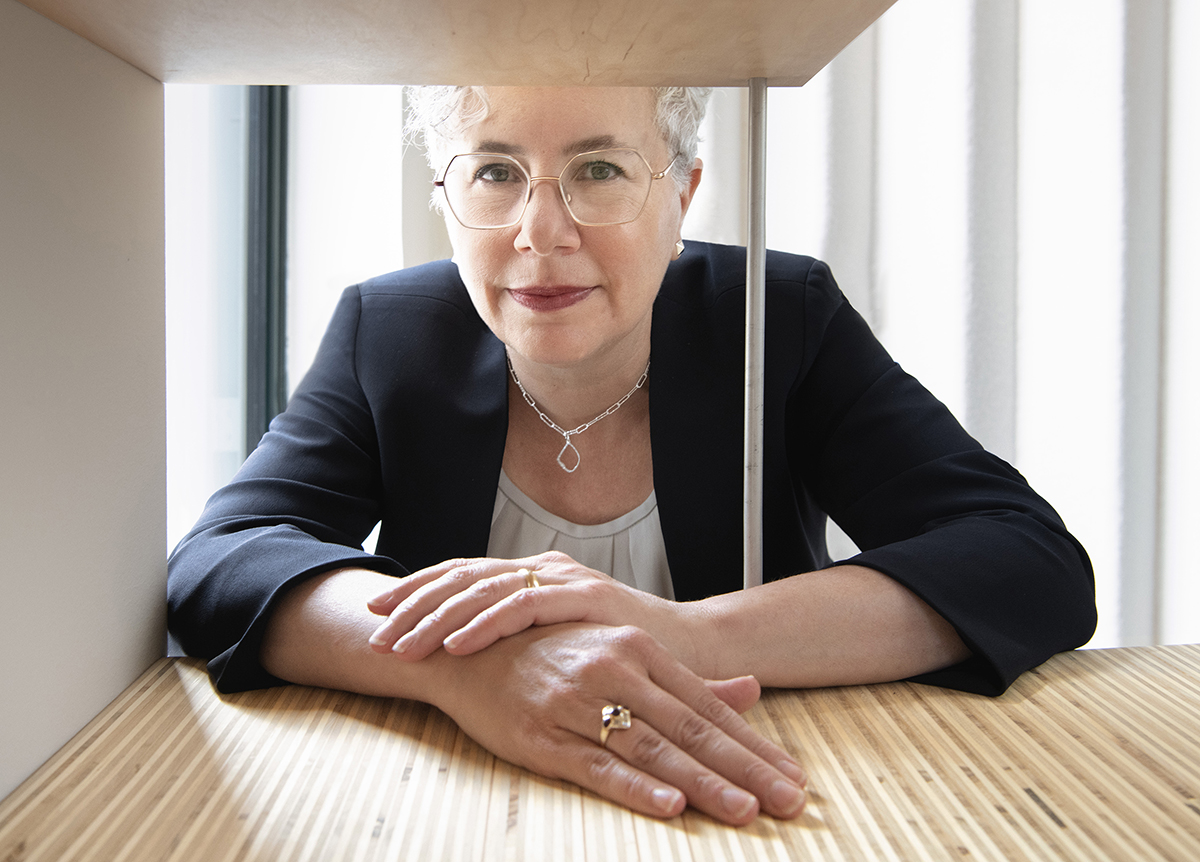Someone You Know is a Sex Worker, 2011
"Someone You Know is a Sex Worker" is a media campaign launched by the St. James Infirmary in October 2011. The campaign consists of bus ads and a series of posters. Barbara DeGenevieve and I collaborated on the creative production of the campaign. On Sunday October 16, 2011 we held a media launch party at Intersection for the Arts in San Francisco.
Bus ad
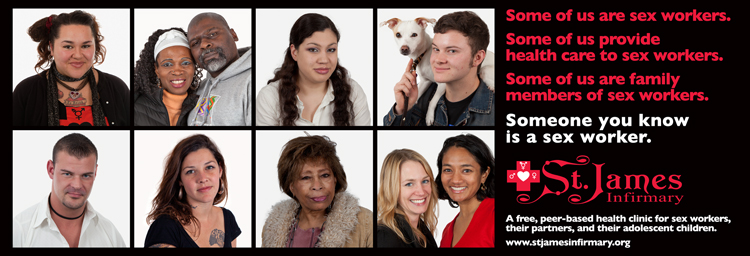

Posters
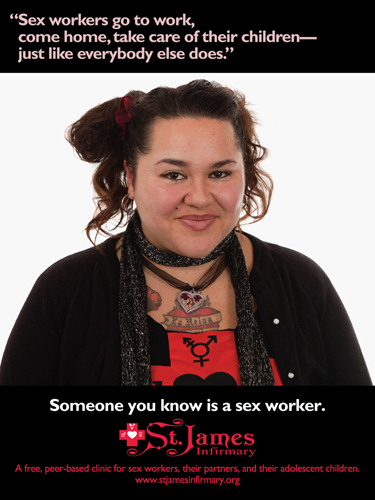
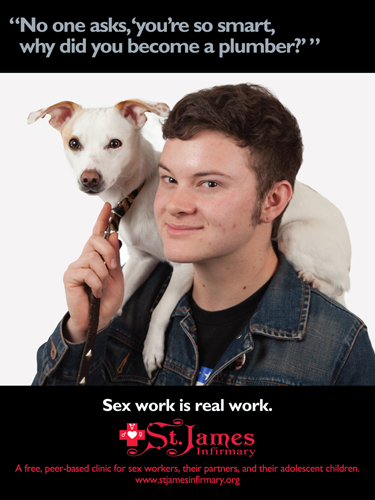

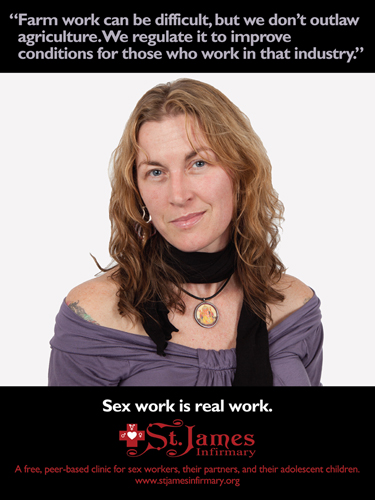
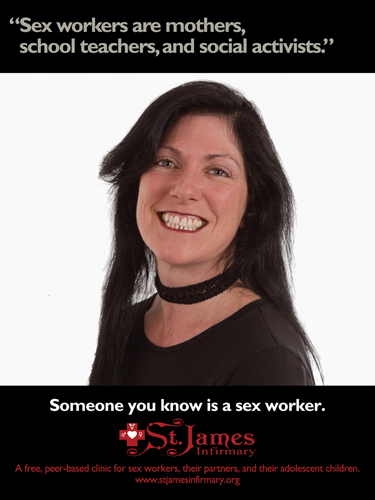

Press Coverage:
New York Times
SF Weekly
SF Huffington Post
SF Bay Guardian
Interview with Stephany Ashley of SJI on Bay Area People, KTVU
Press release:
Sex Workers’ Rights Are Human Rights: A Media Campaign Sponsored by the St. James Infirmary
San Francisco, CA, September 22, 2011—The St. James Infirmary (SJI), a free peer-‐ based health care clinic for sex workers in San Francisco, announces its first major media campaign featuring local sex workersto raise public awareness about sex workers’ rights. Despite being rejected by Clear Channel, CBS Outdoor, and the San Francisco Arts Commission, SJI’s campaign will appear on Muni buses throughout the month of October and will be featured in an art exhibit and launch party at Intersection for the Arts, 925 Mission Street, San Francisco, on October 16 2011 from 5–8pm.
SJI initially sought to place this campaign on area billboards, but the creative was rejected by the two major San Francisco billboard re-‐sellers Clear Channel and CBS Outdoor, the latter stating that “sex worker [is] not a family friendly term.” SJI has also sought to circulate its message via public art opportunities through the San Francisco Arts Commission, but has been repeatedly rejected from those venues as well. Titan 360, reseller of ad space on all Muni, BART, and AC Transit Vehicles, readily agreed to sell ad space to SJI, acknowledging the importance of SJI’s work and its contribution to the SF Bay Area community.
SJI volunteer graphic designer, artist, and sex worker activist Rachel Schreiber joined forces with Chicago fine arts photographer Barbara DeGenevieve to create this campaign of portraits and interviews with participants from all over the Bay Area. DeGenevieve and Schreiber interviewed and photographed 27 sex workers, adult industry workers, and people involved in survival sex exchange; their family members and partners; and their social service providers. The quotes and photographs used in the SJI campaign derive from these interviews.
The media campaign promotes SJI’s philosophy that social stigma contributes negatively to the health and wellness of sex workers. Our goals are to raise awareness of the important work of SJI, to increase financial support of our work, and to educate the community that sex workers are equal members of society. The vast majority of media coverage on the topic of sex work focuses on sex trafficking, leaving little space for important coverage of other issues pertinent to sex workers. The statistics quoted by anti-‐trafficking media campaigns are often highly inflated and under-‐researched, as evidenced by the recent article “Real Men Get Their Facts Straight” by Martin Cizmar et al that appeared initially in the Village Voice and also in the SF Weekly (June 29, Volume 30 Number 23). SJI believes that biased research leads to harmful policies, and leads legislators to channel funding to law enforcement rather than housing and health care.
SJI opposes trafficking, but additionally seeks to give voice to the wide range of individuals who work in the sex industry by choice—including erotic dancers, escorts, adult film industry professionals, and street-‐based prostitutes. Additionally, SJI protects the rights of all sex workers, including current workers, former workers, and those who identify as survivors of the sex trade. We believe that sex workers themselves need to be heard on the issues facing our community, including lack of access to health care and city services, violence, oppression, stigmatization, and unequal treatment by law enforcement.
SJI, a private 501(c)(3), provides compassionate and non-‐judgmental healthcare and social services for current and former sex workers of all genders and sexual orientations, and their families. An often-‐cited model, we are the first and only peer-‐ run, full spectrum primary health clinic for sex workers in the United States. Since we opened our clinic in 1999, we have served over 3,000 sex workers and their families through our clinic-‐based services and have provided outreach services to more than 20,000 sex workers in the Bay Area. SJI is a fully licensed free community health clinic funded by the City of San Francisco Department of Public Health; federal government through a Title X, Reproductive Health grant; and individual donors and private foundations, including the craigslist Charitable Fund, Blue Shield, Third Wave Foundation, the Sisters of Perpetual Indulgence, and the Syringe Access Fund.
###
